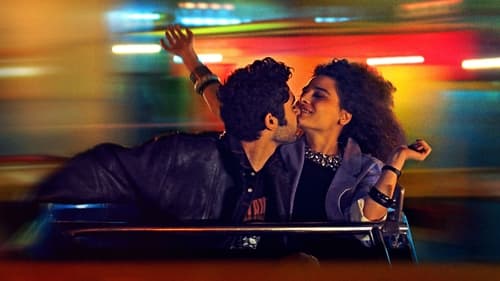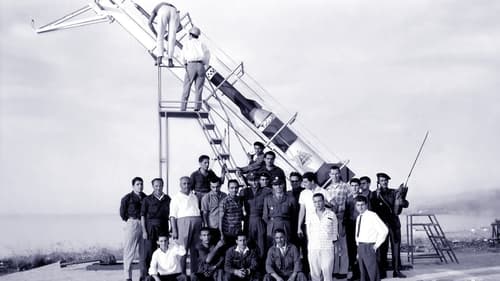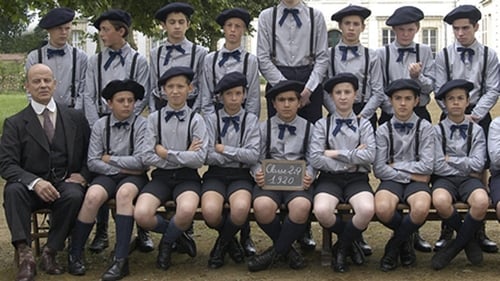Khalil Joreige
출생 : 1969-01-01, Beirut, Libano

Director
Nowadays, Beirut is often deprived of electricity. It is not a one-time accident but a new state. In the national museum, visitors find themselves in darkness and use their phones to light the traces of past civilizations as their world crumbles.

Director
Maia, a single mother, lives in Montreal with her teenage daughter, Alex. On Christmas Eve, they receive an unexpected delivery: notebooks, tapes, and photos Maia sent to her best friend from 1980’s Beirut. Maia refuses to open the box or confront its memories, but Alex secretly begins diving into it. Between fantasy and reality, Alex enters the world of her mother’s tumultuous, passionate adolescence during the Lebanese civil war, unlocking mysteries of a hidden past.

Director
Paris, May 8, 2020. Two days before the end of the lockdown in France. We try to follow the path filmed by Marguerite Duras in Les mains négatives years ago. We are deprived of movement, of unexpected encounters, of freedom, of cinema… “You who have a name, who have been given an identity, I love you with an indefinite love,” said she.

Director
This film is from the project Unconformities, comprised of artworks made up from the material of surveyed land, extracted from coring construction sites in Paris, Athens and Beirut. These cores bare their "unconformities"—temporal ruptures, natural disasters, geological movements—in full view, revealing a constant cycle of construction and deconstruction that is the defining feature of civilisations past and present, with each using the stones of the last. History appears not as layers but as actions, a kind of palimpsest mixing epochs and civilizations. These poetic recompositions question the dominant forms of narrating and representing history, but also address debates around the Anthropocene.

Director
Joana Hadjithomas and the artist and poet Etel Adnan met fifteen years ago. They quickly became close, sharing a city that they had never been to: Smyrna, in Turkey. Joana’s paternal Greek family were forced into exile from Smyrna by the Turkish armies after the end of the Ottoman Empire. Etel’s Greek mother was also born in Smyrna and was married to a Syrian officer of the Ottoman Army and exiled in Lebanon after the fall of the empire. Etel and Joana have both lived in an imaginary Smyrna, today called Izmir, without ever setting foot there. Nowadays they are confronted with the transmission of history and trauma, questioning their attachment to objects, places, imaginary constructions and mythologies without images. What is to be done with the sorrow of our parents? Their personal experiences, their stories serve as a background to the region’s changes after the fall of the Ottoman Empire, the evolution of the borders questioning the notion of identity and belonging.

Director

Director
Lebanon's brief flirtation with space travel in the 1960s becomes a poignant metaphor for the Arab world's utopian dreams in this riveting documentary.

Writer
July 2006. Another war breaks out in Lebanon. The directors decide to follow a movie star, Catherine Deneuve and a friend, actor and artist Rabih Mroue;, on the roads of South Lebanon. Together, they will drive through the regions devastated by the conflict. It is the beginning of an unpredictable, unexpected adventure...

Director
July 2006. Another war breaks out in Lebanon. The directors decide to follow a movie star, Catherine Deneuve and a friend, actor and artist Rabih Mroue;, on the roads of South Lebanon. Together, they will drive through the regions devastated by the conflict. It is the beginning of an unpredictable, unexpected adventure...

Director
Six stories, six films that follow on from each other; this is a glance at the childhood of renowned directors whose style has marked the history of film. A group of young directors focus their cameras on the story of these filmmakers, these childhood stories that sometimes shape an entire life and thus shed light on their cinematic works. The stories overlap to merge into one film about childhood, filled with emotional wounds, frustrations and encounters.

Director
말렉(지아 사드)은 어머니 클라우디아(줄리아 카사르)와 함께 레바논 베이루트의 한 동네에서 단 둘이 살아가고 있다. 별다른 대화는 없지만 두 모자는 서로에 대한 애틋한 마음을 갖고 있다. 그러던 어느 날, 말렉은 거리에서 운전 도중 사랑하는 제이나(알렉산드라 카와기)를 우연히 보게 된다. 하지만 번잡한 도심 속에서 그녀를 쫓기란 요원한 일이다. 그녀에게 문자를 보내보기도 하지만 그녀는 이미 그에게서 떠난 상황이다. 말렉의 어머니 클라우디아(줄리아 카사르) 역시 15년 전 내전의 와중에서 납치된 아버지를 기다리고 있다. 지극히 평범한 주택가에서 살고 있는 그녀는 언제나 테라스에서 창밖을 내다보며 시간을 보내지만 늘 매일 똑같은 일상이 반복된다. 한편, 말렉은 제이나의 마음이 돌아서길 기대한다. 그녀가 있는 나이트클럽을 찾아가 함께 춤을 추고 잠자리를 함께 하기도 한다. 그런데 세상 모든 것이 쉽게 변하지 않는 것임을 깨닫는다. 절제된 사운드트랙 아래서 영화에는 별다른 사건이 벌어지지 않는다. 그저 사랑의 회복을 바라는 말렉과 그의 어머니 클라우디아 두 사람의 공허한 일상이 잔잔하게 펼쳐진다. 거리의 생생한 소음은 그들 목소리보다 언제나 커서 그들은 그저 생활 속에 묻혀 지낸다. 각자의 방식으로 상대방이 돌아오기를 기다리는 그들은, 그렇다고 해서 강렬한 열망을 지닌 채 살아가는 사람들도 아니다. 그저 그렇게 매일을 지탱할 수 있는 삶의 동력이 필요할 뿐이다. 그런 점에서 라는 제목은 무척이나 역설적이다. 어쩌면 그러한 무료하고 공허한 날들 자체도 ‘퍼펙트’한 것일 수도 있음을 말하는지도 모르겠다. 로카르노영화제에서 돈키호테상을 수상했다.
(EBS)

Writer
말렉(지아 사드)은 어머니 클라우디아(줄리아 카사르)와 함께 레바논 베이루트의 한 동네에서 단 둘이 살아가고 있다. 별다른 대화는 없지만 두 모자는 서로에 대한 애틋한 마음을 갖고 있다. 그러던 어느 날, 말렉은 거리에서 운전 도중 사랑하는 제이나(알렉산드라 카와기)를 우연히 보게 된다. 하지만 번잡한 도심 속에서 그녀를 쫓기란 요원한 일이다. 그녀에게 문자를 보내보기도 하지만 그녀는 이미 그에게서 떠난 상황이다. 말렉의 어머니 클라우디아(줄리아 카사르) 역시 15년 전 내전의 와중에서 납치된 아버지를 기다리고 있다. 지극히 평범한 주택가에서 살고 있는 그녀는 언제나 테라스에서 창밖을 내다보며 시간을 보내지만 늘 매일 똑같은 일상이 반복된다. 한편, 말렉은 제이나의 마음이 돌아서길 기대한다. 그녀가 있는 나이트클럽을 찾아가 함께 춤을 추고 잠자리를 함께 하기도 한다. 그런데 세상 모든 것이 쉽게 변하지 않는 것임을 깨닫는다. 절제된 사운드트랙 아래서 영화에는 별다른 사건이 벌어지지 않는다. 그저 사랑의 회복을 바라는 말렉과 그의 어머니 클라우디아 두 사람의 공허한 일상이 잔잔하게 펼쳐진다. 거리의 생생한 소음은 그들 목소리보다 언제나 커서 그들은 그저 생활 속에 묻혀 지낸다. 각자의 방식으로 상대방이 돌아오기를 기다리는 그들은, 그렇다고 해서 강렬한 열망을 지닌 채 살아가는 사람들도 아니다. 그저 그렇게 매일을 지탱할 수 있는 삶의 동력이 필요할 뿐이다. 그런 점에서 라는 제목은 무척이나 역설적이다. 어쩌면 그러한 무료하고 공허한 날들 자체도 ‘퍼펙트’한 것일 수도 있음을 말하는지도 모르겠다. 로카르노영화제에서 돈키호테상을 수상했다.
(EBS)

Writer
Nabil returns to Beirut with the ashes of his father who died abroad. He tries to overcome his bereavement while his family insists on respecting rites and customs by burying a non-existent corpse.

Producer
Nabil returns to Beirut with the ashes of his father who died abroad. He tries to overcome his bereavement while his family insists on respecting rites and customs by burying a non-existent corpse.

Director
Nabil returns to Beirut with the ashes of his father who died abroad. He tries to overcome his bereavement while his family insists on respecting rites and customs by burying a non-existent corpse.

Director
A copy of the filmmakers' first feature film disappeared somewhere in Yemen on the 10th anniversary of the reunification of north and south. A year later, they returned to track down the print, embarking on a journey that would take them across forbidding terrain from Sana to Aden. What they discover is a land of contradictions where film is openly reviled and secretly loved, teaching them much about their status as filmmakers in the Middle East.

Writer
One of the most popular Lebanese films of the late 1990s, Around the Pink House is a story that explores the changing urban landscape of Beirut after the Civil War. La maison rose (the pink house) is an old mansion in Beirut where the Nawfal family found shelter during the Civil War. Unfortunately for them, their immediate environment is rapidly changing, as many of the old shell-ridden buildings are being torn down and replaced by new construction projects. When Mattar, the owner of the pink house, decides to sell it to make room for a large commercial centre, the residents of the neighbourhood become divided between the shopkeepers and businessmen in favour of a different kind of modernity.

Director
One of the most popular Lebanese films of the late 1990s, Around the Pink House is a story that explores the changing urban landscape of Beirut after the Civil War. La maison rose (the pink house) is an old mansion in Beirut where the Nawfal family found shelter during the Civil War. Unfortunately for them, their immediate environment is rapidly changing, as many of the old shell-ridden buildings are being torn down and replaced by new construction projects. When Mattar, the owner of the pink house, decides to sell it to make room for a large commercial centre, the residents of the neighbourhood become divided between the shopkeepers and businessmen in favour of a different kind of modernity.

Director
Rounds is a video featuring Rabih Mroué, filmed steering through the streets of the city. Beirut is mentioned, evoked through the driver’s stories and through sound, but never seen, invisible in overexposed whiteness. However, the presence of Beirut is confirmed through the ongoing discourse. Like his driving, Mroué’s stories spin in a circle. He is like a ghost, haunting the streets of a city where a reconstruction project is in progress in a strange postwar period.

















